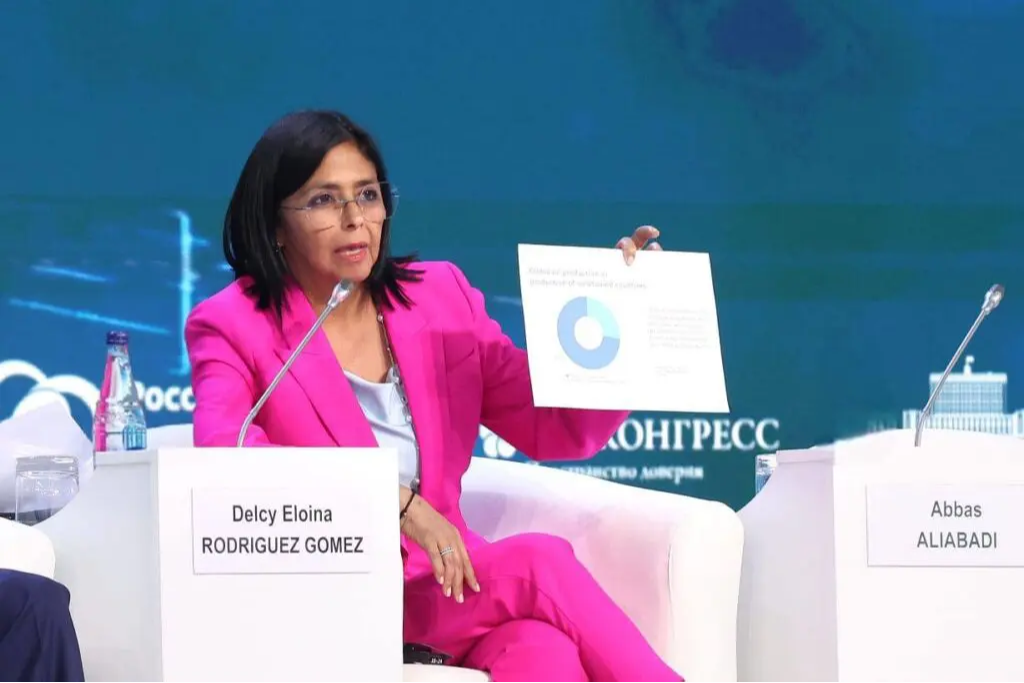
«Today, the sanctioned countries are experiencing a geopolitical reconfiguration and Venezuela's oil, Venezuela's energy reserves, have been considered a geostrategic objective of the Pentagon,» said the executive vice president of Venezuela, Delcy Rodríguez. | Photo: ViceVenezuela
Moscow, September 26 (RHC)-- During Energy Week in Moscow, an international energy forum, the Vice President of Venezuela, Delcy Rodríguez, highlighted the geopolitical reconfiguration at a global level and pointed out the key role that the Global South will play in the face of the decline of Western hegemony.
In her speech at Energy Week, held in Moscow from September 26th to the 28th, Delcy Rodríguez, offered a detailed analysis of the geopolitical changes that are coming to the global energy market.
Delcy Rodriguez highlighted the growing role of the Global South in energy demand, the strategic role of Venezuelan oil, and the resistance of sanctioned nations to economic aggression.
The Venezuelan vice president emphasized that by 2040 and 2050, the countries of the Global South, especially India, China, and Africa, will be the main players in energy demand. "The Global South will be playing a predominant role, as the BRICS Plus space does today," she said, highlighting that this alliance is already a fundamental driver in the world economy.
According to the vice president, this phenomenon marks a geopolitical reconfiguration that positions sanctioned countries, such as Venezuela, at the center of the global energy board.
The Venezuelan leader praised the role of the BRICS (Brazil, Russia, India, China, and South Africa) in the international economy, indicating that their influence will continue to grow in the coming decades. "The BRICS maintain a decisive participation in global economic growth," he stressed, emphasizing that this block is key in the search for new commercial mechanisms and in the resistance to unilateral sanctions imposed by hegemonic powers.
Delcy Rodríguez denounced the economic sanctions imposed by the West, emphasizing that they not only seek to destabilize sovereign governments, but also generate an imbalance in the global energy market.
"26 percent of global oil production is illegally sanctioned, in a unilateral manner, violating all international law," she said, warning of the consequences of these measures on the price of crude oil and investment in the energy sector.
For Venezuela, the sanctions represent a direct aggression against its economic and energy stability. "Venezuela's oil and energy reserves have been considered a fundamental geostrategic objective," she noted, adding that Venezuela's energy security has become a strategic priority for power centers in the West.
However, Rodriguez stressed the moral strength of his country to resist these measures. “Venezuela’s greatest strength has been moral (…) The determination not to succumb to unilateral coercive measures is an example of resistance,” he stressed, emphasizing that both Venezuela and Russia have been able to relocate their products to Asia, despite the West’s attempts to isolate them. “Russia has today been able to relocate its products to Asia,” said Rodriguez, highlighting the resilience of the sanctioned countries.
Meanwhile, Delcy Rodriguez stressed that Venezuela’s oil, which represents 19% of the world’s reserves, remains a geostrategic resource of great importance, both for the country and for the global economy.
And she pointed out that it is “impossible for Venezuela to be excluded from the international energy system,” despite the attempts of some Western powers to block the Caribbean country’s participation in the energy market.
Along these lines, the Venezuelan vice president stressed that her country continues to play a crucial role, not only in the supply of oil, but also in the transition to clean energies such as gas.
"Venezuela also has one of the largest gas reserves on the planet," Delcy Rodríguez stressed, indicating that the South American country is well positioned to play a key role in transitional energies.
And she stressed that, like Russia, the Bolivarian nation is already adopting new marketing mechanisms, such as the sale of crude oil in national currencies. «Russian crude oil is now paid for in rubles at 40%, and Venezuela also sells oil in bolivars, in its national currency,» she said, highlighting the search for alternatives to the hegemonic financial system.

